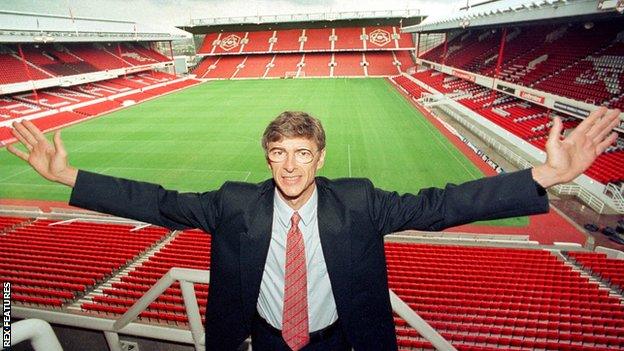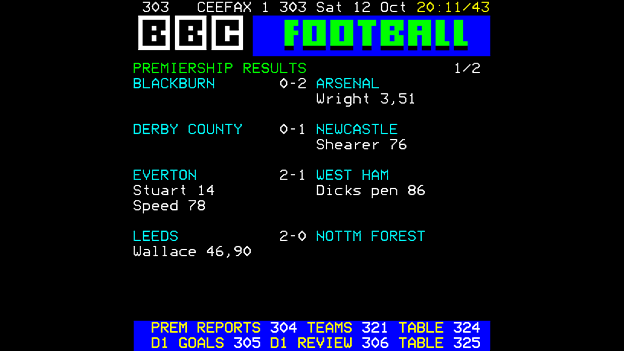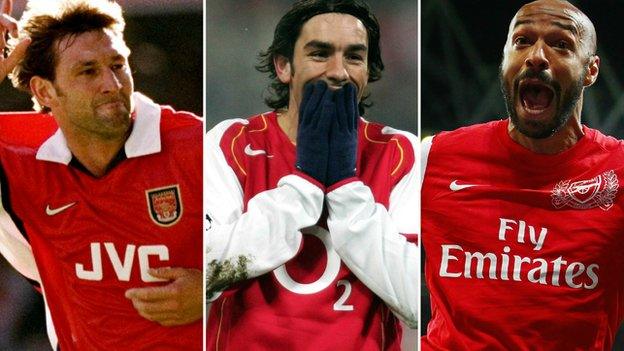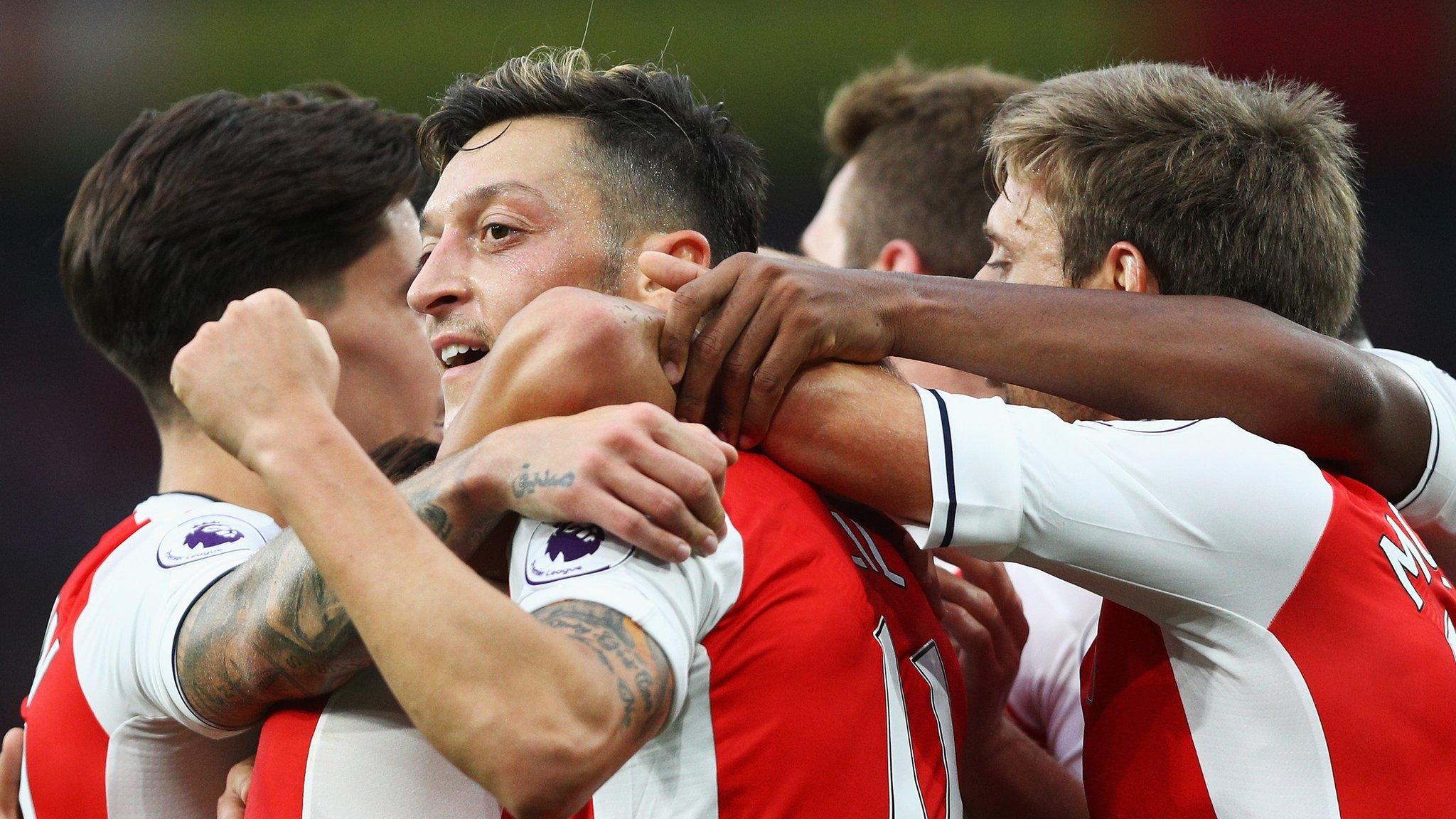Arsene Wenger's 20 years at Arsenal: How will he be judged?
- Published

Arsene Wenger replaced Bruce Rioch as Arsenal manager after spells in charge of Nancy and Monaco in the French league and Grampus Eight in Japan
Twenty years ago, Arsene Wenger arrived in England as a relative unknown, a man plucked from Japanese side Grampus Eight to become only the third foreign manager to take charge of a Premier League club.
Now, after two decades at Arsenal, 15 trophies, a new stadium and almost £700m spent on players, he is the longest-serving - and most successful - overseas manager this country has known.
But what will Wenger's legacy be? To some, he is responsible for transforming the English game. To others, his initial success petered out and he will be judged on a run of 12 years without a league title.
Here, we analyse his record and examine the myths - is he really a reluctant spender and was his second decade really a let down? - of a tenure that began in a different era, his first match coming in a pre-internet age:

Many fans would have heard about Arsene Wenger's first Arsenal result - a 2-0 win over Blackburn on 12 October 1996 courtesy of an Ian Wright double - via Ceefax
The 'top-four trophy' and the actual trophies
Wenger was heavily criticised in 2012 when, with the club contemplating a seventh season without silverware, he suggested finishing in the top four - and therefore qualifying for the Champions League - was effectively a trophy in its own right.
"The first trophy is to finish in the top four," Wenger said, external following an FA Cup fifth-round exit at Sunderland. "I believe finishing fourth is vital for us, so let's focus on that."
If that were indeed the case, his tenure would have been an unequivocal success, having guided Arsenal to a top-four finish in every one of his 20 seasons in charge.
That is something no other club has managed during that time.
When it comes to winning actual, physical silverware, Wenger's Arsenal lag behind only Manchester United and Chelsea. Just one manager - Sir Alex Ferguson - has won more trophies than the Frenchman.
But finishing in the top four does not mean the Gunners have always been title contenders. In fact, in 10 of the past 12 seasons, they have been 10 or more points adrift of the champions.
Closing in on Ferguson
Ferguson was among Wenger's fiercest adversaries during their time in opposing dugouts in north London and Manchester. And the Scot is the only man above Wenger when it comes to the number of Premier League games managed.
Manager | Premier League games | Win % |
|---|---|---|
Sir Alex Ferguson | 810 | 65.2 |
Arsene Wenger | 758 | 57.8 |
Harry Redknapp | 641 | 36.8 |
Sam Allardyce | 467 | 33.6 |
David Moyes | 467 | 40.7 |
Steve Bruce | 392 | 28.1 |
Mark Hughes | 390 | 35.6 |
Martin O'Neill | 359 | 36.2 |
Alan Curbishley | 328 | 32.9 |
Joe Kinnear | 302 | 32.1 |
Wenger is the only overseas presence in that particular top 10. Indeed, he has taken charge of 493 more Premier League matches than any other non-British or Irish manager (Roberto Martinez, 265).
And he is in a league of his own when it comes to comparing his tenure with his current Premier League counterparts, having been in his job 16 years and one month longer than the next longest-serving bosses, Bournemouth's Eddie Howe and Burnley's Sean Dyche.
In his time at Arsenal, the Gunners' four major competitors - Chelsea, Liverpool, Manchester City and Manchester United - have had a combined 42 managers.
Have his second 10 years been a let-down?
Wenger's introduction of new training techniques and a different approach to nutrition helped sustain and advance the careers of many of the players he inherited, including the likes of then-captain Tony Adams, keeper David Seaman and striker Dennis Bergkamp.
Those players formed the spine of a team that won the double in Wenger's second season, the first of three league titles for Arsenal in eight years, culminating in the remarkable success of the Invincibles in 2003-04.
That season, the Gunners went the whole campaign unbeaten, ultimately setting a new record of 49 games without defeat in the top flight.
But there has been no league title since and, after the FA Cup triumph of 2004-05, Arsenal endured a run of nine years without a trophy, a sequence ended by the 2013-14 FA Cup win and followed by a further success in the competition the next year, as well as two Community Shields.
So is it right to say Arsenal have performed significantly worse in the second half of his reign?
Their record is actually remarkably similar in that period to the first decade under Wenger.
More goals - but fewer trophies (all competitions) | ||||||
|---|---|---|---|---|---|---|
Games | Won | Lost | Scored | Conceded | Trophies | |
First 10 years | 566 | 327 | 100 | 1022 | 513 | 11 |
Second 10 years | 563 | 320 | 119 | 1064 | 584 | 4 |
But it is the difference in trophies won where he is judged - 73% of them came in his first 10 years.
Is he too loyal to his players?
Ensuring Arsenal's successful evolution beyond the 1998 double-winning team and the Invincibles was never going to be an easy task.
One accusation levelled at Wenger is that he is not ruthless enough and is too loyal to players in whose development he has invested time and energy.
Earlier this year, Martin Keown said:, external "He treats every player like his own son. When Francis Coquelin was brilliant last season, Wenger should have gone another step higher and said 'no, let's go and get a world-class central midfield player'.
"That would put fear into the rest of Europe, but he's very loyal, almost too loyal."
While it is hard to judge exactly when a player is past his best, it is certainly the case that Wenger's Arsenal are more likely than any other leading club to keep players for longer.
Team | Players with more than 100 appearances in past 20 years |
|---|---|
Arsenal | 48 |
Chelsea | 40 |
Man Utd | 35 |
Tottenham | 30 |
Liverpool | 27 |
Man City | 25 |
And, of the top clubs, only Manchester United have used fewer players in that period than the Gunners.
Team | Players used |
|---|---|
Man Utd | 159 |
Arsenal | 162 |
Man City | 176 |
Chelsea | 191 |
Liverpool | 192 |
Tottenham | 193 |
Perhaps part of the reason that players stay longer at Arsenal - and fewer are used - is that he has always seemed unwilling to spend money on major signings.
Wenger: A reluctant spender?
Wenger is often accused of failing to pay the necessary money to strengthen his squad when it matters, most notably when his bid of £1 above Luis Suarez's £40m release clause prompted Liverpool owner John W Henry to tweet: "What do you think they're smoking over there at the Emirates?"
Wenger said in August that he believes "the only way to be a manager is to spend the club's money as if it were your own", and he has built a reputation for financial prudence.
So do the figures back up that notion?
The Gunners consistently spend less than their main Premier League rivals. In fact, they have only outspent Chelsea in a season four times during the course of his 20 years in charge - and not once since 2009.
Indeed, Wenger has spent more than £60m in a season only twice. Chelsea, Liverpool, Manchester City and Manchester United have done it 34 times in total between them.
Arsenal's move to Emirates Stadium from Highbury in 2006 is usually cited as the main reason for Wenger's cautious approach.
In the six years either side of that move, Arsenal paid a total of £122.79m in transfer fees. Chelsea twice spent more than that in a single season during that period (£142.35m in 2003-04 and £138.89m in 2004-05), and have spent more than double the amount their London rivals have paid in transfer fees in the 20 years since Wenger's arrival in England.
While the Arsenal boss has spent big on several occasions in recent seasons, his signings account for only three of the top 20 most expensive deals in Premier League history - and none of the top eight. Manchester City and Manchester United have seven each of the top 20 transfers to their name.
Most expensive Premier League signings | ||
|---|---|---|
Player | Fee | Buying club |
Paul Pogba | £89m | Man Utd |
Angel di Maria | £63m | Man Utd |
Kevin de Bruyne | £62m | Man City |
Raheem Sterling | £53m | Man City |
Fernando Torres | £49m | Chelsea |
John Stones | £47m | Man City |
Leroy Sane | £42.5m | Man City |
Anthony Martial | £42.5m | Man Utd |
Mesut Ozil | £40m | Arsenal |
Christian Benteke | £39.5m | Liverpool |
Rio Ferdinand | £39m | Man Utd |
Granit Xhaka | £38m | Arsenal |
Juan Mata | £38m | Man Utd |
Nicolas Otamendi | £38m | Man City |
Andriy Shevchenko | £37m | Chelsea |
Robinho | £36.5m | Man City |
Juan Veron | £36m | Man Utd |
Alexis Sanchez | £36m | Arsenal |
Henrikh Mkhitaryan | £36m | Man Utd |
Sadio Mane | £35m | Liverpool |
Transfer fees taken from transfermarkt.co.uk | ||
What next?
Wenger's contract expires at the end of this season, and there have been plenty of calls for him to step down, with some supporters disgruntled at the club's continued inability to mount a genuine title challenge.
He is already Arsenal's longest serving and most successful manager, so what landmarks can he still achieve?
Despite winning six of the 11 finals he has been involved in with the Gunners, Wenger has yet to lift a European trophy, having twice been beaten in finals:
Wenger's record in European finals | |
|---|---|
Competition | Result |
Uefa Cup, 2000 | Arsenal 0-0 Galatasaray (Lost 4-1 on pens) |
Champions League, 2006 | Arsenal 1-2 Barcelona |
He has regularly found the last-16 stage a stumbling block. In fact, Arsenal have been knocked out at that point in each of the past six campaigns.
If he does stay beyond the end of this season, he will edge a little closer to Sir Bobby Robson's record for being the oldest Premier League manager, though he still has quite a long way to go.
Oldest Premier League managers | |
|---|---|
Manager | Age at final game |
Sir Bobby Robson | 71 years 191 days |
Sir Alex Ferguson | 71 years 131 days |
Guus Hiddink | 69 years 188 days |
Dick Advocaat | 68 years six days |
Harry Redknapp | 67 years 335 days |
Arsene Wenger | 66 years 343 days (as of 30 September) |
Excludes caretaker managers | |
Speaking of age, Wenger has yet to give a Premier League start to a player born after he was appointed by Arsenal, though he has come close with Alex Iwobi, who was born just 151 days beforehand.
Arsenal squad members born after Wenger joined the club | |
|---|---|
Player | Time between Wenger's appointment and player's birth |
Gedion Zelalem | 0 years 117 days |
Ainsley Maitland-Niles | 0 years 332 days |
Krystian Bielik | 1 year 95 days |
Jeff Reine-Adelaide | 1 year 108 days |
Chris Willock | 1 year 122 days |
Ben Sheaf | 1 year 127 days |
Stephy Mavididi | 1 year 242 days |
Joshua da Silva | 2 years 22 days |
And there is one first he will be keen to avoid. Wenger's Arsenal have never finished below north London rivals Tottenham. They came close last year, only leapfrogging Spurs on the final day courtesy of a 4-0 win over Aston Villa and Mauricio Pochettino's side's shock 5-1 defeat by relegated Newcastle.
If that record goes this season, could that mark a shift in north London power and signal the end for Wenger?
Or, alternatively, could he sign off after 21 seasons by leaving to take the England manager's job?
- Published21 April 2018

- Published28 September 2016
- Published22 September 2016

- Published24 September 2016

- Published25 September 2016
- Published14 January 2018
- Published7 June 2019
